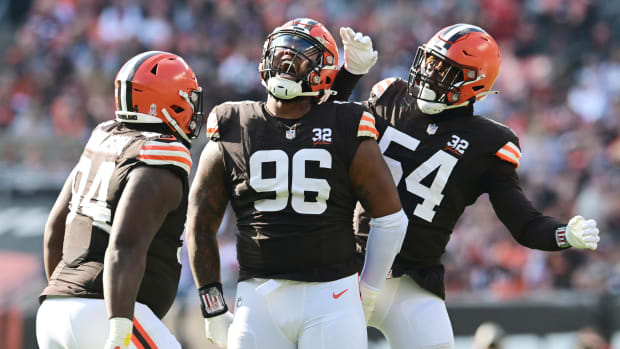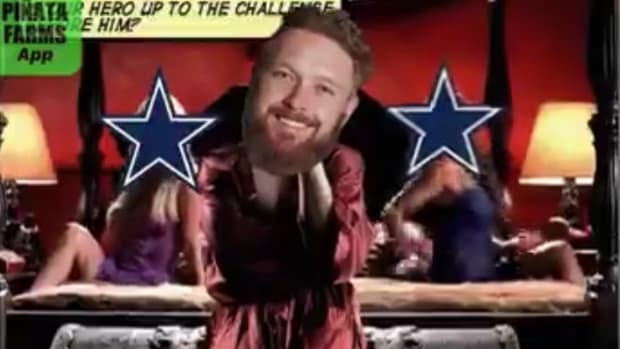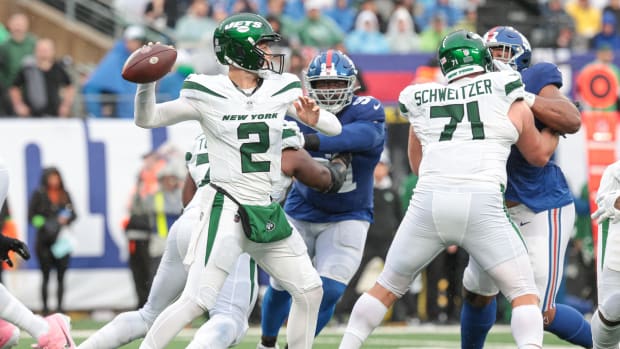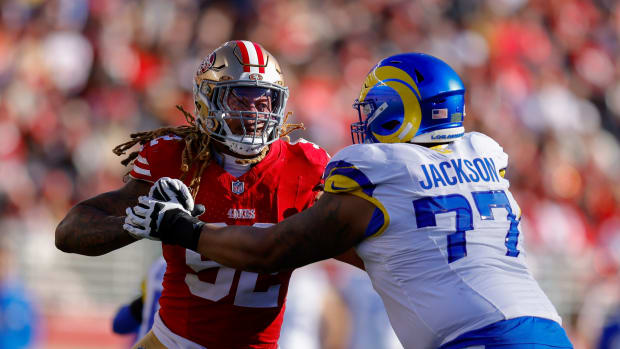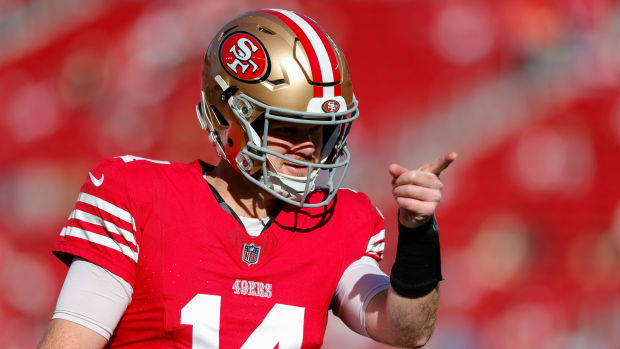The unlucky 13: Most agonizing postseason defeats in NFL history
Losing any game is heartbreaking, but losing in the playoffs is far tougher. Losing in the Super Bowl? Well, that’s the absolute worst.
A postseason loss can hurt that much more when it comes in agonizingly close fashion, and one play makes the difference. After their team’s 10–9 divisional round loss to the Seahawks on Sunday afternoon, Vikings fans could be forgiven in thinking that this game was the most awful in franchise postseason history. But when we tabulated the results, we discovered that this was not the worst playoff defeat for the Vikings (thank you, Gary Anderson), and Blair Walsh’s missed 27-yard field goal as the game wrapped up wasn’t even the worst botched last-second kick.
The list of agony below is taken in large part from articles that Chris Burke and I wrote summer of 2015, in which we opined on the biggest ‘gut-punch’ loss for every NFL franchise. Chris did the NFC, I did the AFC. There is plenty of postseason sadness in those lists to be sure, so I looked back and ranked the 13 worst losses in order of complete team dishevelment.
• BURKE: Bengals lose control as all hell breaks loose in loss to Steelers
1. Jan. 12, 1969, Super Bowl III—Jets 16, Colts 7
The 1968 Baltimore Colts, coached by Don Shula, had one of the best defenses of all time and lost just one game in the regular season. Quarterback Earl Morrall was the NFL's Most Valuable Player, and given the ways in which the Packers beat the Chiefs and Raiders in the first two Super Bowls, nearly everyone expected Baltimore to put a serious smack-down on the Jets in Super Bowl III, especially after Joe Namath guaranteed victory in the week leading up to the game. It was not to be.
The Jets defense, headed by defensive line coach Buddy Ryan, played a masterful game, and Morrall threw three interceptions. The Jets controlled the ball with tough running from Matt Snell, who picked up 121 yards on 30 carries and should have been the game's MVP instead of Namath. The Jets’ win, one of the biggest upsets in sports history, brought a sense of equality and parity to the AFL-NFL merger, but it sure didn't do anything for the Colts. Even when they won Super Bowl V two seasons later, the players on both of those Colts Super Bowl teams said that the stink of the previous championship loss would never go away. —Doug Farrar
2. Feb. 1, 2015, Super Bowl XLIX—Patriots 28, Seahawks 24
The play call heard ’round the world. Trailing New England by four with 26 seconds left, and in need of just one yard to win a second consecutive Super Bowl, the Seahawks opted for a pass on second-and-goal. You know the conclusion: Malcolm Butler jumped Ricardo Lockette's route for an interception, arguably the most improbable Super Bowl ending of all time.
Chiefs stare down their playoff demons by terrorizing Hoyer, Texans
In addition to Russell Wilson’s and Marshawn Lynch’s running capabilities, the Seahawks also still had a timeout left—they could have run, come up short and still had multiple cracks at the end zone. Seattle fans also will not soon forget that their team’s vaunted defense surrendered back-to-back fourth-quarter touchdowns to the Patriots, permanently flipping the scoreboard in New England’s favor. —Chris Burke
3. Dec. 23, 1972, AFC divisional round—Steelers 13, Raiders 7
The Raiders of the late 1960s and early ’70s were the AFL’s and AFC’s version of the Cowboys: the team that was always great but could never quite win the mythical big one. The 1972 Steelers were just happy to be in the first playoff game in a 40-year history that featured far more failures than successes. The Raiders had a 7–6 lead with time running out in this divisional playoff in Pittsburgh when Terry Bradshaw threw a pass to running back John Fuqua over the middle of the field. The pass either hit Fuqua or Raiders safety Jack Tatum—nobody is really sure—and fell into the hands of Franco Harris, who ran the ball in for a 60-yard touchdown.
The question was, who touched the ball last? If it was Fuqua, the catch was not a catch. If it was Tatum, or Fuqua and Tatum consecutively, it was.
After the play, referee Fred Swearingen got on the phone with Art McNally, the league's head of officiating. Depending on who you ask, Swearingen was either trying to confirm the catch call with McNally, or asking how many policemen would be able to escort his crew off the field if he ruled based on what really happened. To this day, it's a mystery, and it's the one game Raiders head coach John Madden will never get over. —DF
4. Jan. 27, 1991, Super Bowl XXV—Giants 20, Bills 19
Dan Quinn understands the struggle for sought-after coaches in playoffs
This was the first of four straight Super Bowls the Bills lost in the early 1990s, and the only one of the four that was remotely close. The Bills came in as the favorite to win, with their flashy “K-Gun” no-huddle offense. But the Giants, coached by Bill Parcells and quarterbacked by backup Jeff Hostetler, had the perfect strategy to stop Jim Kelly, Thurman Thomas and Andre Reed: keep them off the field. Big Blue held the ball for over 40 minutes in the game, and there was a point on either end of the half where the Bills didn't get the ball for more than a full hour on the clock. The Bills were sloppy on defense, especially on third down, but they did hold a 19–17 lead in the fourth quarter that was then eliminated by Matt Bahr’s 21-yard field goal.
And when it came time for Bills kicker Scott Norwood to win the game with four seconds left... well, we all know what happened. A 47-yard field goal attempt went wide right, sending the Bills on their way to an ignominious streak. This was perhaps the most painful of their Super Bowl losses, because it's the one they really should have won. —DF
5. Jan. 18, 2015, NFC championship—Seahawks 28, Packers 22
It’s now nearly a year later, and the ending to this game remains surreal. The Packers all but had their bags packed for Super Bowl XLIX, up 19–7 and having picked off Russell Wilson with five minutes left. From there, just about everything that could go wrong did. The Seahawks forced a punt, then scored a touchdown, recovered an onside kick and scored again (complete with a ridiculous two-point conversion), all within a span of 2:19. The onside kick was the killer—Brandon Bostick went up for the ball, blocking it from the sure-handed Jordy Nelson.
The Packers forced overtime with their own clutch drive late, but a Wilson-to-Jermaine Kearse touchdown ended the festivities. —CB
6. Jan. 17, 1999, NFC championship—Falcons 30, Vikings 27
“And Anderson hasn’t missed in two years,” famed play-by-play man Pat Summerall noted as the Vikings’ Gary Anderson lined up for a 39-yard field goal that would have put his team ahead by 10, with a little more than two minutes to play.
Adrian Peterson sorts out his feelings on fatherhood, forgiveness, loss
“So that's a pretty good bet,” John Madden replied. “If you say, ‘Do you think Gary Anderson will make this field goal?’ The answer’s probably yes.”
Jinxes being what they are, Anderson pulled the kick right, leaving Minnesota's lead at a precarious 27–20. Atlanta’s Chris Chandler hit Terrance Mathis to tie the game moments later, allowing Morten Andersen to win it for the Falcons in overtime. The loss was just the Vikings’ second of the season.
(Bonus: To my knowledge this is also the only ‘gut punch’ discussed in a sitcom.) —CB
7. Feb. 3, 2008, Super Bowl XLII—Giants 17, Patriots 14
This wasn’t supposed to be a game—it was supposed to be a coronation. The Patriots were coming into the Super Bowl with an 18–0 record, and had been beating the daylights out of nearly every team they faced through the 2007 season. But the Giants, who held New England to a close win in the regular-season finale, dialed up an excellent game plan that had multiple defensive linemen putting pressure on Tom Brady right in his face, and the team that set the single-season scoring mark was held to two touchdowns. When David Tyree made his famed helmet catch, the outcome seemed to be ordained from on high. In truth, the team that won out-coached the team that lost, which is always a threat to happen, no matter how great one of those teams or coaches may be. —DF
8. Jan. 17, 1988, AFC championship—Broncos 38, Browns 33
Marty Schottenheimer had a big, bad history of postseason angst, but this was the worst. Denver got past the Browns in the AFC championship game a year earlier thanks to John Elway’s famous drive. In the 1987 rematch, Denver jumped out to a 21–3 lead, but Cleveland quarterback Bernie Kosar threw three touchdown passes to bring his team back. One of those scoring throws was to running back Earnest Byner, and Byner also rushed for a four-yard touchdown in the third quarter. However, with the Browns driving late in the game, down 38–31, Byner fumbled the ball at the Denver two-yard line, stripped by Denver defensive back Jeremiah Castille. The Broncos recovered and gave the Browns an intentional safety to essentially end the game.
QB acumen, vision make Adam Gase right choice to turn Dolphins around
“Earnest never saw Castille coming,” Schottenheimer later told ESPN. “Earnest was the reason we were still in the game at that point. He had several heroic runs and catches over the course of the second half that allowed us to have a chance to tie the game at 38. All of these heroics, unfortunately, were overshadowed by a single draw play from the eight-yard-line.”
It’s a shame, too, because Byner was a great player who rushed for more than 8,000 yards in his career, and eventually got a Super Bowl ring with the 1991 Redskins. But that’s the play for which he’ll always be remembered—the biggest playoff loss for a franchise that has had more than its share. —DF
9. Jan. 30, 2000, Super Bowl XXXIV—Rams 23, Titans 16
Until Russell Wilson’s ill-fated pass at the end of Super Bowl XLIX, this was the game that ended with the biggest gut-punch in Super Bowl history. The Rams scored the first nine points of this game, but led by quarterback Steve McNair, the Titans fought their way back and had a 16–16 tie with 1:54 left in the game. That's when Kurt Warner hit Isaac Bruce for a 73-yard touchdown for what became the deciding score, but Tennessee sure made the Rams worry about their win.
On the game’s final drive, McNair took the game into his own hands, quite literally, handling the ball on every play on a drive that started at the Titans’ 10-yard line. McNair’s running and passing had the Rams on their heels until the last play, when he hit Kevin Dyson for a nine-yard reception. Problem was, the game clock was out of time, and the Titans made that play from their own 10-yard line. Rams linebacker Mike Jones stopped Tennessee one agonizing yard short of a chance at the only Super Bowl to go into overtime. —DF
10. Jan. 10, 2016, NFC divisional round—Seahawks 10, Vikings 9
Proof positive that sometimes, agonizing playoff losses can happen exactly one year apart (see the Patriots-Ravens game below). The third-coldest playoff game in league history was a deep-freeze offensively for both teams in the first half—Seattle and Minnesota combined for 185 total yards in the first half, and Russell Wilson seemed especially affected by the cold, completing just six of 11 passes for 39 yards in the first 30 minutes. Things started to heat up just a bit for both teams in the second half after a 3–0 halftime score in the Vikings’ favor. Minnesota kicker Blair Walsh booted two more field goals in the third quarter, and it looked for all the world that he would be the hero of the game.
• WATCH: Biggest plays from Seahawks-Vikings wild-card game
Then, Seattle constructed an improbable touchdown drive in the fourth quarter, with the biggest play of that series a 35-yard pass from Wilson to rookie receiver Tyler Lockett. The play was a disaster at first, as Wilson missed the snap from center Patrick Lewis and had to run to chase the ball before scrambling and hitting a wide-open Lockett. Two plays later, he connected with Doug Baldwin for a three-yard touchdown. A Steven Hauschka field goal put the Seahawks ahead for the first time in the game with 8:04 left in the game, but the Vikings weren’t finished threatening.
The drive that should have won the game for Minnesota started at the Vikings’ 39-yard line with 1:42 left. QB Teddy Bridgewater started with two incomplete passes, but the second incompletion cost Seattle dearly, as safety Kam Chancellor was flagged for pass interference, and the ball was moved to the Seattle 42. Bridgewater then hit Rudolph for a 24-yard gain, and it seemed that all Mike Zimmer’s team had to do was bleed the clock and set Walsh up for his fourth field goal of the day.
Nice narrative, but with 26 seconds left in the game, Walsh hooked his try wide left, and the Seahawks escaped with a victory in a game they probably shouldn't have won. —DF
• Players on and off the field react to Blair Walsh's missed kick
11. Jan. 10, 2015, AFC divisional round—Patriots 35, Ravens 31
The Ravens had this one in hand—twice. They opened the game with a 14-point lead over the Patriots, who scratched back to tie the game before the half. Then, Baltimore extended its lead to 28–14 in the third quarter, and that's when all hell broke loose. With 9:33 left in the third quarter, New England went with a weird formation: TE Michael Hoomanawanui at left tackle and RB Shane Vereen as an ineligible receiver in the right slot. At the snap, Hoomanawanui ran up the left seam, while Vereen backed off into the backfield. Baltimore's defense was torn between wondering what Vereen was doing and covering Rob Gronkowski, who was on the right side of the formation, opposite Hoomanawanui. Tom Brady hit Hoomanawanui for a 16-yard gain, and Ravens coach John Harbaugh was not amused.
Harbaugh was even less amused five plays later, when Vereen was officially declared ineligible before the play, and Hoomanawanui was wide open for another big gain in a similar formation—14 yards this time. The Patriots got back in the game with a Tom Brady five-yard touchdown pass to Rob Gronkowski, and then, receiver Julian Edelman tied it again with this 51-yard pass to Danny Amendola.
Harbaugh said after the game that the ineligible player strategies weren’t fair, because his defense should have the opportunity to ID the men they need to cover. But as Brady pointed out, this kind of trickery happens on special teams all the time. In any case, it set the Ravens on their heels, and with 5:13 left in the game, Brady hit Brandon LaFell with the winning touchdown pass. And as we later saw in Super Bowl XLIX, the Patriots weren’t done giving huge heartbreaks to opponents in the 2014 postseason. —DF
12. Jan. 7, 1996, AFC divisional round—Colts 10, Chiefs 7
More Marty Schottenheimer. The 13–3 Chiefs looked to be the AFC’s best team, and they started their postseason against a Colts team that was without Marshall Faulk and Tony Siragusa. The problem was a frozen field at Arrowhead Stadium that prevented kicker Lin Elliot from making any of the three field goals he attempted, which proved to be more than the difference. Quarterback Steve Bono threw three picks before he was benched for Rich Gannon, and Colts quarterback Jim Harbaugh was a relatively unspectacular player who simply didn't make mistakes.
Amazingly, this was the first of two Chiefs teams under Schottenheimer's leadership that went 13–3 in the regular season and blew a tire in the divisional round—the 1997 team collapsed late in the game against the Broncos. And yet, neither of these losses (nor the two Browns losses mentioned earlier) was Schottenheimer's most agonizing postseason blunder... —DF
13. Jan. 14, 2007, AFC divisional round—Patriots 24, Chargers 21
This is the third gut-punch loss for Schottenheimer. The 2006 Chargers was the best team he ever had—they won 14 games—their two losses were by a total of six points—and RB LaDainian Tomlinson set the NFL record for rushing touchdowns in a season with 28. The Chargers sent nine players to the Pro Bowl, and their progress through the playoffs seemed to be a fait accompli. San Diego put up a 14–3 lead late in the first half of this game, but the Patriots, as has been their wont through the Belichick era, found ways to win. In this case, it was the simple matter of standing out of the way and letting the Chargers shoot themselves in their collective foot, over and over. Schottenheimer’s team turned the ball over just 15 times in the regular season, but did so four times against the Pats. The real killer came when Tom Brady threw an interception to Chargers defensive back Marlon McCree, who tried to run the ball instead of going down. He fumbled, and the Patriots recovered.
Schottenheimer was roundly criticized for several play calls in the game, and between that and his longtime feud with general manager A.J. Smith, he became the only head coach in NFL history to go 14–2 and lose his job. —DF

































